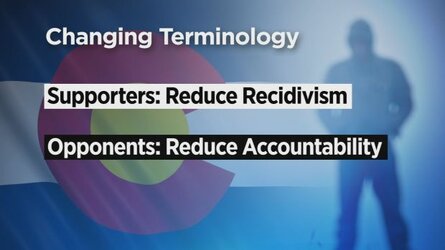
The way sex offenders are labeled is changing in Colorado. The board that sets state standards voted today to change the term “sex offenders” to reflect so-called “person-first” language.
The Sex Offender Management Board, which is made up of everyone from public defenders to prosecutors, sets standards and guidelines for treatment providers so the new terminology will only be used in that context. It doesn’t change the term sex offender in law or the criminal justice system but some worry it’s a step in that direction.
“I’m involved today after hearing that it would be improper or offensive in some manner for me to refer to the man who raped me, as a sex offender.”
A rape survivor, Kimberly Corbin is among those who spoke out against changing the term sex offender to something less stigmatizing, saying labels based on traits people can’t control is one thing, “It’s very, very damaging for those who people who are labeled when it has to do with gender, race, sexuality, ability, but those are not their choices, the biggest thing for me is these are choices that sex offenders make.”
Derek Logue says he shouldn’t have to carry the label for life, “Referring to me by a label for something I did half my life ago is inappropriate and downright offensive.”
He argued “client” would be a better term.
Public Defender Kathy Heffron agreed, “It takes into consideration the uniqueness of individuals who are receiving treatment.”
“Client” is one of five options the board considered.
Supports of the change in terminology argue it will reduce recidivism. Opponents say it will only reduce accountability, noting victims and survivors live with their label for life.
In the end, the board voted 10-6 to go with “adults who commit sexual offenses.”
“I think this strikes a balance that honors the impact to victims and recognizes the current and ongoing impacts of sexual assault but also avoids the labeling term that has negative impacts on those who commit sex offenses.”
Jessica Dotter with the Colorado District Attorneys’ Council worries the change won’t end with the Sex Offender Management Board, “I’m concerned that the use of person-first language generally is an intent to remove accountability from offenders and to diminish the experience of the victims”
Last year, lawmakers considered a bill that would have, among other things, eliminated the term “sexually violent predator” from statutes but they ended up pulling it. Meanwhile, a task force charged with sentencing reform is considering asking the legislature to change terms like “defendant,” “convict,” and “felon” to “justice-involved people.”
Ironically, the Sex Offender Management Board will not drop “sex offender” from its name because only the state Legislature can change the name of the board.

Colorado State Board Drops 'Sex Offender' Term Calling It A Negative Label
The way sex offenders are labeled is changing in Colorado. The board that sets state standards voted today to change the term "sex offenders" to reflect so-called "person-first" language.

State Board Drops ‘Sex Offender’ Term Calling It A Negative Label – C…
archived 20 Nov 2021 18:49:11 UTC